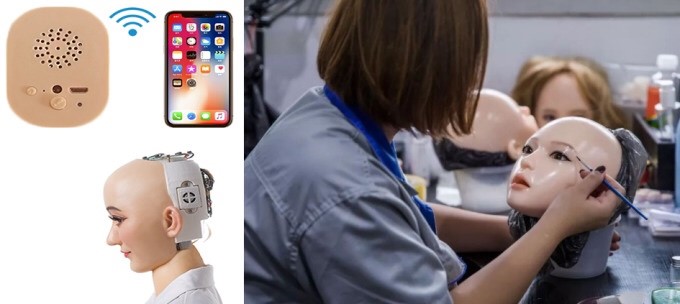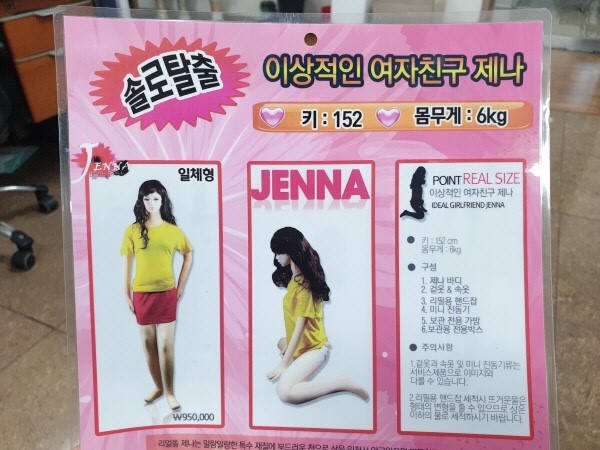In June, the Supreme Court ruled on the importation of the so-called Real Doll, a human sized female figure often used for intimate relationships. Within one month of the decision, a Blue House petition to reverse the policy, garnered over 260,000 signatures. The public posted the petition on July 8 stating that “The Real Doll may seriously undermine human dignity, so we need to ban its import and sales.” With more than 260,000 people in agreement, a government response to the petition is imminent. The key issues a hand are the rights to ‘sexual self-determination and invasion of privacy’ versus the preservation of ‘human dignity’. Public opinion on the matter is clearly divided. On the one hand people feel that the state has no right in to intervene in a person’s sexual decisions, while on the other hand, people feel that the Real Doll is a violation that targets a woman’s body. The government is collecting opinions on the import of product from the Korean Customs Service.
Real Doll is a full-body silicone figure that is manufactured to resemble a real woman. In Korea, concerns arose after the Supreme Court's approval of the import of the product because it commercializes women. Controversy also arose because people can customize their doll with the face of specific people. In addition, some real dolls, modeled after children, are being sold overseas. As a result, there are growing calls for regulations surrounding the importation and use of the real child doll, because it can encourage sex crimes against children. However, not all countries share the same opinions regarding the Real Doll. Apart from some Islamic countries, Real Doll is regarded as a type of sexual toy, so nations are permitting their citizens to import them. European countries, such as France and Spain, rent out Real Dolls on an hourly basis and the U.S. is trying to make Real Dolls into something that can share feelings with other people. However, there are limitations to their approval. Real Dolls modeled after children are frowned upon and import restrictions have been imposed. In addition to the negative reactions to Real child Dolls from overseas, there has been a public debate about the use of child dolls for a long time. Korean Citizens are requesting the government look to overseas’ cases and prepare policies and restriction in advance to thwart any efforts to import the child-like replica. To illustrate, according to the Australian Border Force (ABF) and Federal Police (AFP), the number of child-like real dolls imported to Australia increased rapidly. The issue renewed the debate about whether the possession of this item increased acts of pedophilia in society or keeps children safe in Australia. As a result, child-like Real Dolls that are anatomically correct, are classified as “unpleasant objects” according to Customs Act 1901 and the regulations of these items require import permits to Australia. A person with an unauthorized doll can be sentenced to up to 10 years in prison and fined up to $450,000. In 2017, five men in Queensland were punished for importing illegal dolls, which weighed about 15kg and were around 100cm tall. There is also case law to suggest that the items are related to the definition of child abuse material, contained in section 91FB of the Crimes Act 1900 (NSW). The production, dissemination or possession of such materials is a crime under Section 91H of the law, with a maximum penalty of ten years’ imprisonment.
 |
| ▲ The real doll with voice recognition technology (Left), The production process of the real doll (Right). (Photo from Baidu) |
In other parts of the world, a Real Doll is considered a ‘sex toy’ and they are becoming more popular by the day. Sex robot deliveries are beginning to show up at doors around the world. However, advanced countries such as Britain, Canada, the U.S., Australia and Norway only regulate the distribution and purchase of child-like forms. In the U.S, the “CREERER” law, which bans the production of real-doll or sex robots in the form of children, was passed by Congress in 2018. Norway regulates the purchase of Real Dolls that are 125 centimeters or less. The United Kingdom issued a guideline in March stating that those who distribute or purchase child-like Real Dolls can earn up to 12 months in prison.
With regards to the import of adult forms of the Real Doll, both pros and cons are being considered. Those in favor of the dolls, cite an individual’s right to sexual freedom as foremost in consideration. Everyone has the freedom of choice and privacy, even in the sexual realm. The Supreme Court mentioned, “Governments must minimize their intervention in the individual’s personal and furtive areas” in their decision. In other words, the government should not restrict the importation and use of the Real Doll. Secondly, proponents argue that the Real Doll can decrease sex crimes and prostitution. By using the Real Doll, people can relieve their sexual desires, in a legal and private manner. In addition, a Real Doll can be used by those who do not often have access to sexual encounters, such as the elderly or disabled. In an interview with E-daily, Professor Sim Bong-suk, mentioned that the main target of the Real Doll is the sexual outsider and people who think of it as an expression of their personality. Thirdly, customized Real Dolls, the main point of dispute, are impossible, because it requires the model’s permission and comes at a high price for that type of quality product. According to an interview with Kukmin Ilbo, an import company, making a real doll designed to be a specific person is impossible. To make it, they have to measure the eyes, nose and mouth of the individual and require a 360 degree photo of the person’s face. This means making a Real Doll to replicate a specific person using only photograph or video is impossible. However, many others disagree. They say Real Dolls aggravate the problem of sexual merchandising. According to an interview with Professor Aimee van Wynsberghe of the Netherlands Delft University of Technology and Guardian, US edition, “By using real dolls, there is a possibility of seeing a woman only as a sex object”. The child-like Real Doll is also being purchased, so that not only an adult woman, but a child can be the target of this kind of sexual merchandising. Secondly, customizing body parts is possible. According to the Kukmin Ilbo, they can make customized busts, genitals, or anything else buyers demand. Even though the companies do not or cannot replicate a real person’s face, making their products similar to a real person and customizing its parts is possible. So opponents remain unconvinced that Real Dolls are not intended to be sexually merchandise women. Thirdly, there is no evidence to suggest that Real Dolls actually decrease sex crimes or prostitution. According to an interview on CBS radio with Korea’s Cyber Sexual Violence Response Center’s vice president, “Permitting Real Dolls is tantamount to legalizing prostitution. However, regions that legalized prostitution saw an increase in the rate of sex crimes because they see woman as a commodity for purchase”. Kathleen Richardson, a professor of De Montfort University, mentioned that along with the development of the sex robot industry, nations have seen a rise on the number of women participating in prostitution. So the Real Doll does not decrease prostitution or sex crimes.
 |
| ▲ The leaflet of real doll of Daegu's adult products store. (Photo from Daegu newspaper) |
As there are the pros and cons to both sides of the Real Doll debate, the concept is still very much under discussion. This issue is not about men and women, but rather about the values we wish to reflect in our society in terms of gender equality rather than gender confrontation. This means, the government should clarify the current legal system to prevent future problems with the importation of Real Dolls.
 |
| ▲ More than two hundred thousand people participated in the petition against real doll imports.(Photo from national petition homepage) |
신지희, 김건희, 나승민, 오주현 dankookherald@gmail.com

![[Campus Magnifier] Let's Surf the Library!](/news/photo/202404/12496_1765_4143.jpg) [Campus Magnifier] Let's Surf the Library!
[Campus Magnifier] Let's Surf the Library!
![[Campus Magnifier] Let's Surf the Library!](/news/thumbnail/202404/12496_1765_4143_v150.jpg)





